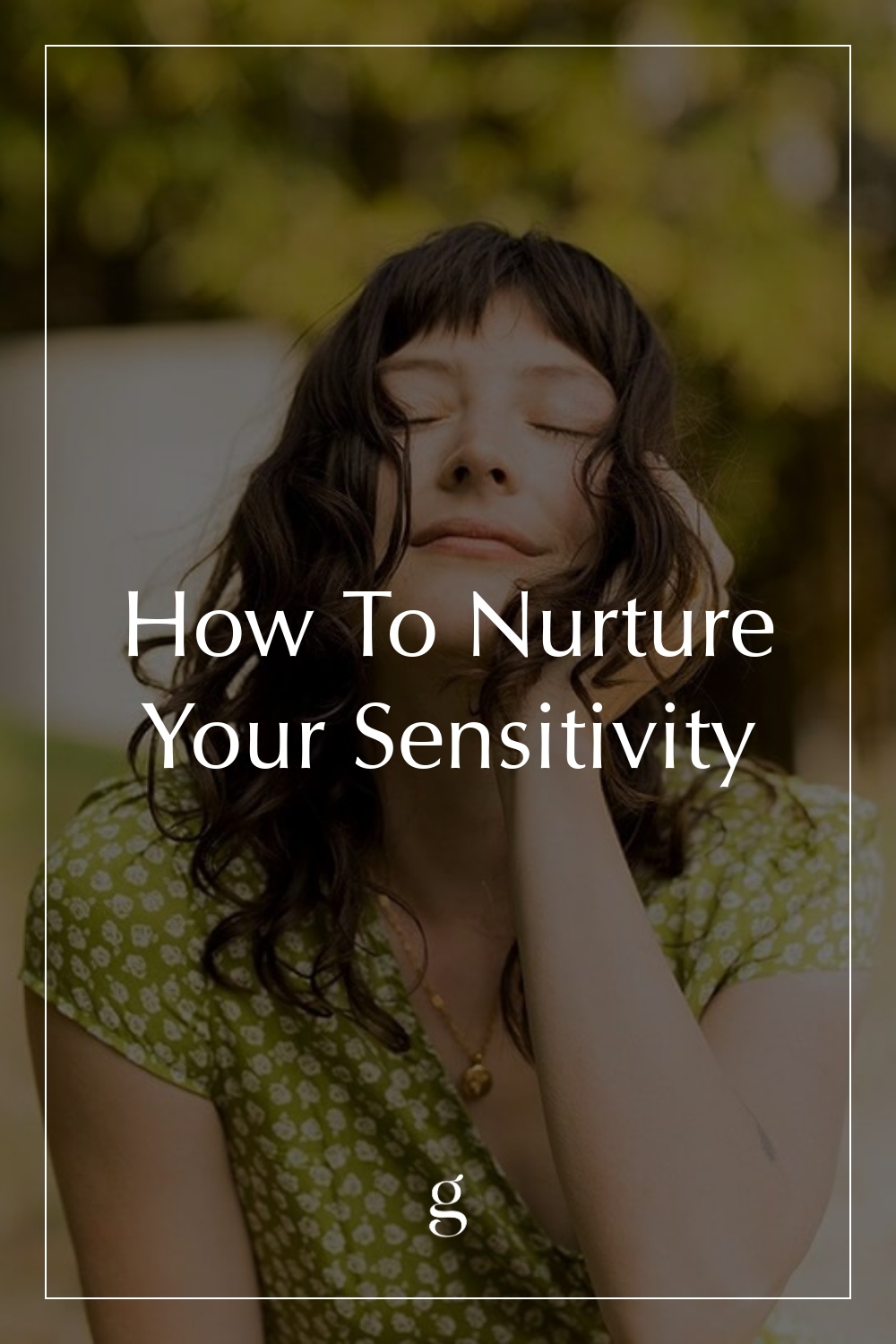
How To Nurture Your Sensitivity
“If you want to cry, you should cry.”
My friend said to me one evening last summer, his eyes locked on mine. We sat at a corner table in a local sports bar, sharing a basket of fries and memories from our childhoods. One memory evoked complicated feelings for me, including sadness and anger, and my emotions were suddenly pouring out of my mouth without permission. I immediately tapered them—a subconscious reaction when my sensitivity gets the best of me. I wanted to sound calm and collected, not like someone who so easily gets ruffled and derailed by emotion.
“It’s okay—a gift even—to be honest about how I feel.”
“If you want to cry, you should cry. If you want to feel something, you should feel it,” my friend repeated. He didn’t push me but instead affirmed the feelings I was working so hard to bury, reminding me that it’s okay—a gift even—to be honest about how I feel.
As a sensitive person, I’ve always known my feelings are more prominent than for many people—I’ve never struggled to recognize that. It isn’t a typical weeknight if I don’t experience both euphoria and melancholy in the same evening or even the same hour. But I’m comfortable embracing this complexity, when alone that is. While I’ve learned to ensure my feelings don’t sit in the driver’s seat, they are still present, like a low hum. It’s just that, when I’m at home, I don’t feel a need to hide or lessen them.
It’s the shame of being a sensitive person in public that I struggle with most. When I see myself through the lens of society, I feel as if I need to somehow hide how I’m truly feeling, which in turn means hiding myself. The goal is to seem stronger to others, or at least unmoved, especially by something as fleeting as a feeling.
“Sensitivity is not inferior to strength; quite the opposite.”
The world doesn’t exactly know what to do with sensitive people. Thus, we often feel out of place or like there is something wrong with feeling “too much.” We equate this with being too much. Sensitivity is less desirable than strength, or so we hear. In response, we learn to hold back, trick ourselves even when we’re around others. We bury the emotions dancing inside us and fight back any visible sign that we may be feeling something.
But sensitivity is not inferior to strength; quite the opposite. Our strength lies in our ability to be true to who we are and our ability to nurture that truth—both when we’re alone and around others. For sensitive people, this looks like nurturing our feelings and encouraging them forward. The only question left is how.
1. Allow yourself to be sensitive
Give yourself permission to be a sensitive person, and embrace this part of you without shame. You are not sensitive OR strong; you are both. Your sensitivity does not take away from other parts of you but rather shades the entire picture, making it all the more beautiful and unique to you. The moment we allow ourselves to be who we are, without judgment or a need to “fix” our feelings, we begin the journey towards self-love and acceptance.
“Embrace this part of you without shame.”
Try positive self-talk to help with this. According to psychologists, the practice has emotional wellness benefits, and, over time, these messages become internalized, shaping how we see ourselves. Look yourself in the mirror today and say, “I am a sensitive person, and that is wonderful. My sensitivity is a gift to me, to my loved ones, and to this world.”
2. Show off your sensitivity
Once you begin feeling comfortable in your own skin, give yourself permission to be a sensitive person in public. Cry when you need to; express your joy and share it with others. While this may feel uncomfortable at first or even scary, exposure will help to minimize this fear. Remember, you are being true to yourself, and the world deserves to see your sensitivity in all its forms.
“The world deserves to see your sensitivity in all its forms.”
Likewise, establish boundaries for yourself and hold to them without shame. For some sensitive people, loud noises or large crowds can feel rattling, so practice excusing yourself from situations when necessary or speaking up when you feel overwhelmed. A simple request, like “Is it okay if we turn the music down?” is a polite way to advocate for yourself while respecting that not everyone around you is as sensitive to their environment.
3. Lean into the sad and sappy stuff
“For sensitive people, sometimes it feels good to feel sad.”
Here’s your permission to put on the dark and moody playlist despite it being sunny out or to watch the movie that always brings up tears and existential questions. For sensitive people, sometimes it feels good to feel sad, and that’s okay. I’ve learned that when I nurture this particular emotion or any feelings that fall under the umbrella of melancholy, I create more space for lighter feelings to flourish since I’m not suppressing the heavier ones. Plus, Harvard Health says crying is good for you, as tears “flush stress hormones and other toxins out of our system.” So cry away.
Just remember, again, that not everyone around you is a sensitive person, and they may not want to join the afternoon sad sesh. Respect their boundaries just as you hope they would respect yours, and remember that just as you love to feel all of your feelings, other people aren’t wired to feel things so deeply all the time. We can learn from one another.
4. Find a therapist
One of the best ways I’ve nurtured my sensitivity is by finding a therapist, specifically one who is paid to listen to me. Talking about your feelings with someone impartial is incredibly—you guessed it—therapeutic. Better yet, a therapist can also offer insight and gently nudge us when our emotions are leading us astray.
“Nurturing our sensitivity isn’t only about leaning into our feelings—it’s also about learning to question them.”
Nurturing our sensitivity isn’t only about leaning into our feelings—it’s also about learning to question them, especially when they aren’t showing us the complete picture. We can witness our emotions and acknowledge them while also recognizing that how we feel at any one given time isn’t always a great barometer for decision-making.
Therapy is also a helpful tool for processing your feelings aloud and giving them room to breathe, especially if you don’t always feel safe expressing them at home or in your daily life.
5. Live a balanced life
This may sound counterproductive, but it’s helpful to get outside of your feelings every now and then—literally. I find my sensitivity is best nurtured when I actively spend time outdoors, specifically when exercising or engaging in embodied practices.
“it’s helpful to get outside of your feelings every now and then—literally.”
Exercise has been shown to alleviate stress, increase one’s mood, and also help long-term with anxiety and depression, according to the American Psychological Association. And for me, I notice that when I sweat or exert myself through strenuous activities, my usually chatty brain goes quiet for a bit.
Chalk it up to hormones, but I also think our sensitive souls just need a break every now and then. To feel so much all of the time, well, it’s exhausting.
Daily exercise, walking outside in the fresh air, stretching, and even physical wellness practices, like acupuncture or sitting in a sauna, can help us get out of our hearts and heads and into our bodies.
Nurturing one’s sensitivity will look unique for each person, but what’s most important is that we actively embrace our sensitive spirits and treat them with kindness and care. May we remember that our sensitivity is a part of us, and it’s nothing to be ashamed about. As my good friend encouraged me: It’s time we stop holding back.
Kayti Christian (she/her) is a Senior Editor at The Good Trade. She has a Master’s in Nonfiction Writing from the University of London and is the creator of Feelings Not Aside, a newsletter for sensitive people.






